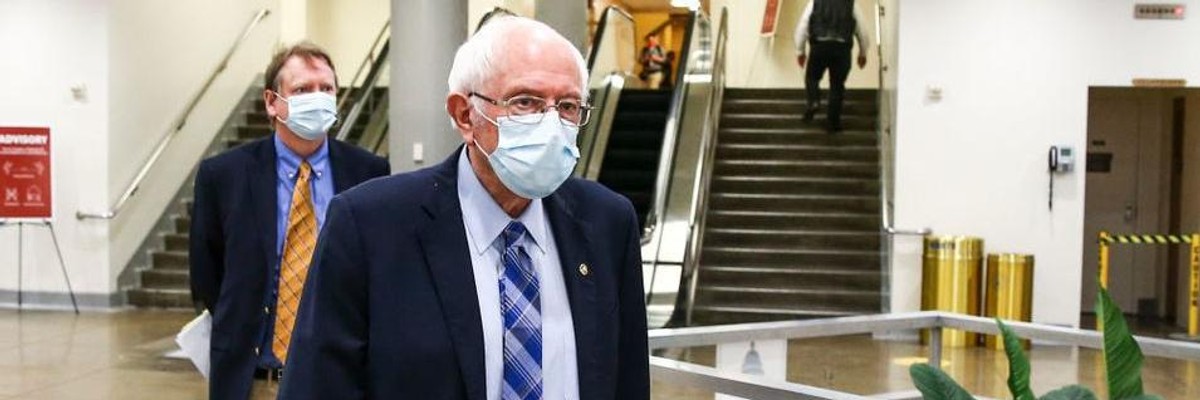After President Joe Biden voiced skepticism that $15 minimum wage legislation can survive the rules of the special procedure Democrats are using to pass coronavirus relief, Sen. Bernie Sanders on Sunday said a team of lawyers at the Senate Budget Committee is working tirelessly to demonstrate that a pay hike for 32 million U.S. workers would have a substantial budgetary impact and therefore should be eligible for reconciliation.
Noting the widespread public support for raising the long-stagnant $7.25 federal minimum wage to at least $15 an hour, the Vermont senator and new chairman of the Budget Committee told CNN that "we have a room full of lawyers working as hard as we can to make the case to the parliamentarian, that in fact, raising the minimum wage will have significant budget implications and, in fact, should be consistent with reconciliation rules."
The Senate parliamentarian is the official tasked with determining whether a measure is in compliance with reconciliation rules, which require legislation to have an impact on the federal budget that is beyond "merely incidental."
Last week, as Common Dreams reported, Sanders pointed to a new research paper by University of California, Berkeley economist Michael Reich showing that raising the national minimum wage to $15 an hour by 2025 would have a positive federal budget impact of $65.4 billion a year. According to Reich, the budget boost would come from a combination of increased tax revenue and reduced federal spending on some social programs that many low-wage workers are forced to rely on to make ends meet.
A recent study by Ben Zipperer and David Cooper of the Economic Policy Institute echoes Reich's findings. "One requirement that often rules provisions out of the budget reconciliation process is that these provisions must have fiscal impacts that are not just 'extraneous,'" the economists note. "This report shows clearly that the fiscal effects of a significant increase in the minimum wage are direct and economically significant."
"I'm proud to be one of the (virtual) 'room full of lawyers' working with Bernie Sanders to get the minimum wage hike [through reconciliation]," tweeted Bill Dauster, chief counsel of the Senate Budget Committee.
In an op-ed for Roll Call last month, Dauster pointed out that the Constitution gives the vice president or the Senate's president pro tempore--currently Kamala Harris and Sen. Patrick Leahy (D-Vt.), respectively--the power to overrule the parliamentarian should the official decide that a minimum wage hike is out of bounds.
"As raising the minimum wage is budgetary, the parliamentarian should allow it to be included in reconciliation," Dauster argued. "If the Senate parliamentarian does not advise them that Congress can include the minimum wage in budget reconciliation, Harris or Leahy should exercise their constitutional authority to say that it can."
Asked Sunday whether he believes Harris should override any parliamentarian ruling against the minimum wage hike, Sanders said he's focused on ensuring that the official comes down on the side of the pay increase and that the Senate has enough votes to approve the legislation.
"I am working as hard as I can to make that happen," said Sanders. Addressing Sen. Joe Manchin's (D-W.Va.) stated opposition to raising the minimum wage to $15, the Vermont senator said the proposal is "not a radical idea."
"Making $600 a week in the United States of America... that's not a lot of money," the Vermont senator added. "I hope, and believe, that at the end of the day members of the Democratic caucus understand that we do need to pass a $15-an-hour minimum wage."
Sanders remarks came days after Biden said in an interview with CBS Evening News that he doesn't think the proposed minimum wage hike--which he endorsed in his $1.9 trillion coronavirus relief offer--is "going to survive" reconciliation rules.
"My guess is it will not be in [the final coronavirus relief package]," the president said, a position one observer criticized as needlessly "defeatist."
David Sirota, a former speechwriter for Sanders, lamented late Sunday that "it says so much about how utterly rigged the system is that it takes a team of lawyers to figure out some hail-mary-pass way to raise the minimum wage, but if corporations want a new $500 billion Fed window, that happens instantaneously with zero trouble."

